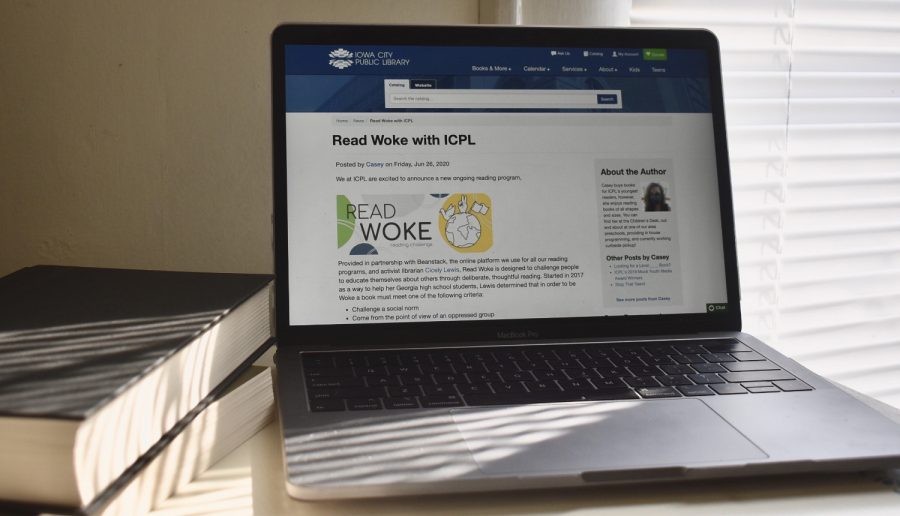IC to implement implicit bias training for landlords, new woke book club
Iowa City is putting on social programs to foster inter-community understanding and acknowledgement of unconscious bias.
The Iowa City Public Library website pictured on Monday, Aug. 31, 2020. The Iowa City Public Library offers a book club focused on Black Lives Matters and inclusivity.
August 31, 2020
Amid Black Lives Matter protests, Iowa City has put new social programs in place seeking to combat implicit bias, including a landlord implicit bias training and a woke book club.
Read Woke, started in Georgia by school librarian Cicely Lewis in 2017, has been an item of interest of Iowa City’s Library since 2018, said Iowa City Public Library children’s librarian Casey Maynard.
For a book to be considered “woke,” it must meet at least one of five criteria, Maynard said. It must challenge a social norm, be from the point of view of an oppressed group, give information about a disenfranchised group, seek to challenge the status quo, or bring to light an unknown issue.
While the library had been looking into ways to bring the program to the Iowa City community since 2018, it was not until around the time of George Floyd’s death that the library’s online book partner, Beanstock, offered to supply the library with “woke” books online.
“As soon as we saw that, we took advantage of it right away and put it out there within a few weeks of seeing that was something that we could do,” Maynard said.
The Iowa City and Cedar Rapids Public Libraries plan to read the picture book Hair Love via Zoom for their inaugural meeting on Sept. 9.
Lists of “woke” books can be found on the Iowa City Public Library’s website.
Iowa City also plans to host an implicit bias training session on Sept. 9 for landlords, property managers, and other businesses. Those interested can register for the Zoom training online, according to the city website, or call in using the number 312-626-6799. The call ID is 944 6721 2614. Registration will be capped at 150 participants.
Thomas Newkirk, a civil-rights lawyer from Des Moines, is one of the presenters for the Zoom session and has spoken at implicit-bias educational programs across the country.
Newkirk said most implicit-bias training is completely ineffective, so he takes an approach more centered in breaking down the barriers that prevent people from having a conversation — defensiveness, polarization, lack of knowledge, individual biases, and the nature of the problem.
Newkirk said 95 percent of discriminatory acts are caused by implicit bias and that most people do not consider themselves to be a racist. Even if half of these discriminatory acts were out of pure, conscious racism, he said what matters isn’t intention, but impact.
“If I’m in denial about my own biases, I’m just as dangerous as a racist, and one thing is true about racists is they also have bias,” Newkirk said. “But the thing no one’s dealing with is that bacteria, that bias that lies underneath.”
Rich Salas, another presenter for the training session, is chief diversity officer and assistant professor at Des Moines University, a private osteopathic medical school in Des Moines, and has been working with implicit biases for around 30 years.
“[Implicit-bias training]’s one tool of many tools that I believe Iowa City recognizes that they have to do,” Salas said. “You have to meet people where they’re at without blaming, without shaming, and making sure that they understand the impact of those perceptions that they’ve grown up with.”






